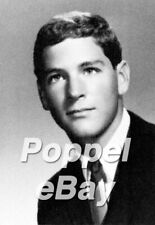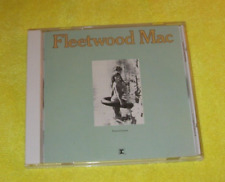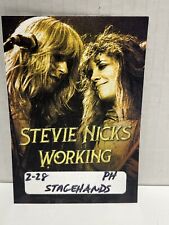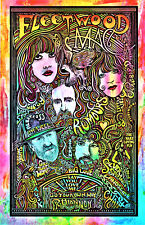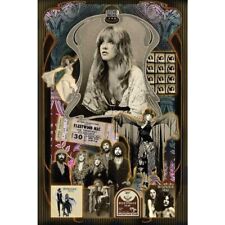|
De Gitarist Fleetwood Mac's John McVie didn't stop De Gitarist, April 1998
Fleetwood Mac's John McVie didn't stop
By Tanya Almor Gambale With their new/old album "the Dance" the men and women of Fleetwood Mac are making good money. But did they also bury the hatchet? Tanya Almor Gambale meets the man who put the Mac in Fleetwood. He's just a bass player. That's what John McVie will tell you. Yes, what he'd really say to you is: "I'm a boring old fart of a bass player…" But, as one of the members of the very first hour he has supported the music of Fleetwood Mac the past thirty years with some very recognizable basslines -- in the longest running soap opera of the modern age. He survived multiple personelchanges, fights and nervous breakdowns. He has been through the best and worst of a group that sold more than 70 million albums. But the story of John McVie begins long before this success… Bluesbreaker
In 1963 John McVie started to play with John Mayall's Bluesbreakers, a band generally seen as responsible for the birth of the British electric blues. A lot of Bluesbreakers became true followers of the blues: people like Eric Clapton, Peter Green, Mick Taylor, Jack Bruce and Andy Fraser. Fleetwood Mac was formed in 1967 with former Bluesbreaker guitarist Peter Green and drummer Mick Fleetwood in the ranks; despite the bandname McVie wasn't part of it immediately. Later he married Christine Perfect, who then sung and played keyboards in British collegue-
bluesband Chicken Shack. A short while after she had given up the music business and had started concentrating on her new role as a housewife, she was enlisted by Fleetwood Mac. She would write them many of their greatest hits.
In 1974 the band moved to America. Here, after gone through a series of replacements for the gone trio Peter Green/Jeremy Spencer/Danny Kirwan, they were finally reinforced with two Americans: guitarist Lindsey Buckingham and singer Stevie Nicks. Mega-success, years of touring and heavy recording-schedules in the end demanded their share. John and Christine divorced, Mick and his wife divorced (to remarry later) and Stevie and Lindsey split up. But somehow the band kept on going. Whatever traumatic it all was, this period did bring the legendary Rumours, an album that is still the third best sold album of all times. 25 million pieces were sold and in its twentieth year it still sells. Tango
After the recording of the 1987 album Tango In The Night, Lindsey Buckingham solemnly declared not to tour with Fleetwood Mac again. After the departure of this important creative force the band could only stumble through various personnel changes, to split up definitely in the end.
During a once-only "reunion"-concert at the inauguration party of President Clinton in 1992 the Mac played the by the Clinton-campaign adopted song Don't Stop. After a recent group-collaboration for a solo project of Lindsey Buckingham, it was established the magic was still present and within short time the original members of the Big Mac were back together again.
After a tv-special in the summer of 1997 The Dance was brought out, a collection of newly adapted classics and new songs, accompanied with a video of the concert. Shortly after that the band went on the road again in America, with a sold out tour through the entire country. It was during this tour, at a sunny Saturday afternoon in his hotel room in
South-California, high above the spectacular coastline of Dana Point, that John McVie talked with Gitarist about his life and career. He's a real modest, honest and warm person. No big ego, no pretensions and no air. You could easily imagine he didn't really change since the days he played in London clubs. Ealing Blues
"A band called the Krewsaders, formed by boys from the same street in Ealing, West London", was John McVie's first job as a bassplayer. "We had jackets, a logo, the whole deal. We played weddings and parties, those kinds of things. Someone called Cliff Barton, bassplayer with Cyril Davis (harp-player with Alexis Korner and Chris Barber) was asked to play with John Mayall. He said: "No, I won't do it because I already play for Cyril Davis. But I know this boy of 15; give him a chance"".
John got his chance and in January 1963 he started, 17 years old, his impressive, five year long tenure with The Bluesbreakers. He played with all the great guitarists and survived several, booze connected personnel changes.
"My first show was in Acton - they paid me 10 shilling - in a pub at the Uxbridge Road".
TAG: How was the music-scene back then?
"Very exciting. In those days you could walk in a club and play along. The early Mac played in the original Marquee Club in Oxford Street. We were very crazy in those days. Jeremy (Spencer) had this enormous dildo, called Harold, with which he got the public excited!".
TAG: Do you miss all that?
"No, I don't miss Harold at all! Yes, I miss the old club-days very much. Nowadays everything is orderly. We have accountants, personal managers and lawyers. And cd's and DAT. But in the end it's just a five-man-band that mounts the stage and plays; we deliver the music. What's behind that is so much more than in the early days. Mayall and I carried our own things and Eric and Peter helped a hand. Now it's limousines, private-jets. But, at least, I hope so, what it's all about is not lost. I spoke to John Lee Hooker recently. He slept one time in my dad's house on the floor when I played with Mayall, during a British tour when we accompanied him. I said: "John Lee, do you remember me?" And he said: " Yes, I slept at your father's floor!" Music-teaching
"Nothing - just John Mayall. He gave me some records of Willie Dixon and B.B. King and said: "Go and listen to this", that was all. This was in 1961, 1962. John put me on the trail. Willie Dixon, Charlie Mingus and later Paul McCartney. They play very melodical, you know, melody-lines within melody-lines. And Bach".
TAG: Who inspires you?
"No one".
TAG: Do you listen to music a lot?
"Yes, but usually the things to which I've been listening to for years. Jimmy Buffet, just pleasant music. I don't do slapping, if anyone may wonder. I hate that. I don't like it if someone threatens me with a four-string instrument and shows how good he is. Technically, it's clever. I could never do that, but they don't understand what it's about. I have
a traditional role behind the singers, the frontline. I love it to be able to play exactly at the same time with Mick's
bassdrum".
TAG: If you play, you direct at Mick's bassdrum?
"No, I try to direct at Christine's keyboard, the part of the left hand. I try to play at the same time as Mick's bassdrum, quite an experience! Mick is no technical drummer, he's a feel-drummer. It's interesting to try to play
along with his foot, because at the front of the stage they do different things all the time, each song is different. He's always slightly ahead of the beat and I'm a bit behind of it, what creates a kind of "torn apart" rhythmic effect. Can you follow me? What I mean is that we in the middle. We come out at the same. It's not a perfect one-and-two,one-
and-two; it's not symphonic". New Mac
TAG: How did you, Mick and Christine feel when you first played with Stevie and Lindsey?
"Incredible - right in the first five minutes. Absolutely! They would just sing with the three of them and it blended fantastically".
TAG: Were you aware that Fleetwood Mac would change completely?
"They were. I'm just a bassplayer, for god's sake!"
TAG: If someone comes with a new song, how do you make up your bassparts?
"On the melody and the bassdrum. It just happens. In Dreams, for example, only the bassnotes F and G were necessary. The most important thing in this song was Stevie's story; it wasn't necessary to digress. I always try to find the minimal thing what's necessary to support. Stevie is not an instrumentalist, she plays a little keyboard. We sit there and say: "Oh, we'll do this…" Stevie's lines are sometimes a little, uh, vague, but in Rhiannon she had this line: "Rhiannon sings… doo da doo doo doo etc." and that was in minor. So I go through that in minor key. Fresh Mac
TAG: Some older bands that have reunions and go tour again sound incredibly fresh. How did Fleetwood Mac
accomplish that?" We are incredibly clean. Especially during the shows. Everyone has gone through it, whether booze or drugs, and came out like we did. We all play an instrument, we're not models turned musician. We were musicians from the first day and found our way back". Peter Green
"Mick is still in contact with Peter. I stayed away from him because I'd rather remember him the way he was. But he was The guitarist.
TAG: And is the blues still your first love?
"Yes! It can't get better than these guys: Eric Clapton, B.B. King, Peter Green. Who else do you have?" What is groove?
"Feel. Soul. You have it or you don't. If you don't have it, you can't get it. And you can't buy it! I believe we have more feel than groove. With groove I think of … Sly Stone; that's a groove. And James Brown, the first band we ever saw. Mick and I have a feel, and sometimes we lock into a groove, but a real groove is Sly. I always found him magical". Retirement
TAG: did you ever think the members of Fleetwood Mac would go in retirement for good?
"No. It was just a gap of a year of two! I knew we would come back together eventually. It's my living! I'm just a musician, good, bad or whatever. I'm just a boring old fart playing bass".
The Big Mac bass-sound
"I play Tobias bassguitars and use SWR Henry the 8th cabinets. I play at the bridge and put my thumb at the middle element. If necessary I dim with my left hand and rest my right hand at the bridge. I use alternate picking - two, sometimes three fingers: simple bassplaying. I find it flattering you ask me all this, but I'm just a simple musician. I
don't do all that flashy stuff. I just stand there and do my part. I see Mick's bassdrumpedal go down and hear
Christine and Stevie sing and that's all.
TAG: Did you ever try something else than a four string bass?
"I did try a five string, but that was a bit too much for me, above my level! I also tried a standing bass, but my left hand isn't strong enough for that".
TAG: Some bass parts on The Dance sound very low. How did you do that?
"For a couple of songs we tuned lower. We tuned down the E-string one and a halve note. In a couple of songs you can hear that: The Chain, So Afraid, Bleed To Love Her and a couple of Stevie's songs in this set".
For the finish, what does John think is his best live and/or studio performance?
"I think this last album is very good!"
|





